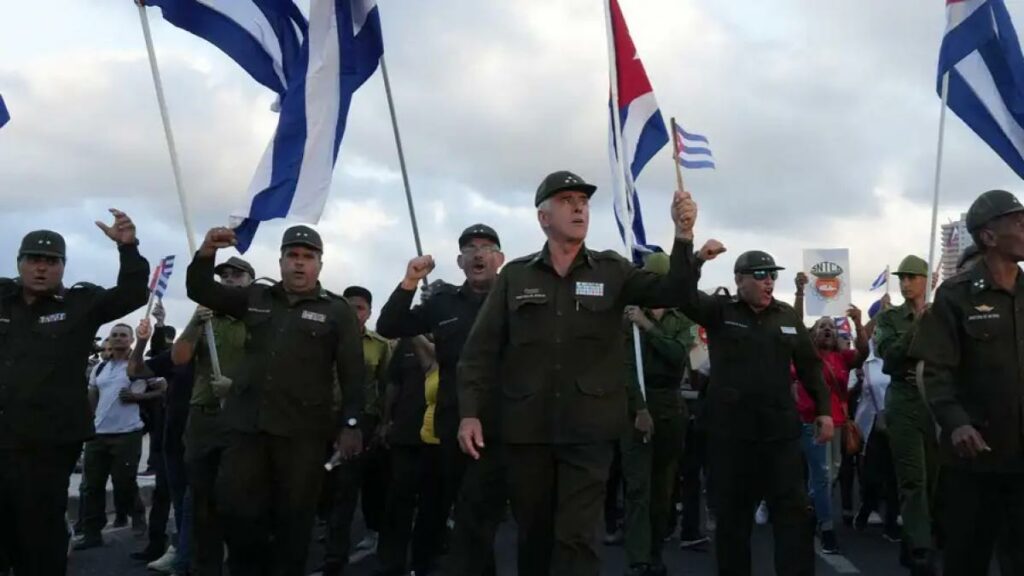As President Joe Biden’s time in office draws to a close, the US economic blockade against Cuba remains an enduring hardship for the island nation. On December 20, 2024, thousands of Cubans took to the streets in a powerful demonstration, demanding an end to the US sanctions that have suffocated their economy and impacted every aspect of daily life. Led by President Miguel Díaz-Canel, the march symbolized the deep frustration of a people who have endured over 60 years of economic isolation. With just weeks remaining in the Biden administration, there is a lingering hope that the US may finally shift its policy toward Cuba and put an end to this long-standing injustice.
Since his election, President Biden had signalled an interest in easing the harsh policies imposed by his predecessor, Donald Trump. However, despite initial promises to restore diplomatic ties and ease travel restrictions, Biden has largely continued the aggressive stance against Cuba. This has left many disappointed, as the Cuban people continue to suffer under the weight of sanctions. The blockade restricts access to essential goods like food, medicine, and fuel, devastating vital sectors like healthcare, agriculture, and infrastructure.
History of the Blockade
The origins of the blockade date back to 1960, when US officials, including Deputy Assistant Secretary of State Lester Mallory, recommended economic sanctions aimed at causing “economic dissatisfaction and hardship” in Cuba. The strategy was clear: the US hoped to weaken the Cuban government by creating a crisis for its citizens. Yet, it is the Cuban people who have paid the price, not their leadership. According to reports in the public domain, the blockade has cost Cuba over $421 million each month, adding up to trillions of dollars in losses over the years. The blockade has also prevented Cuba from accessing international markets, foreign investment, and humanitarian aid, leaving the island vulnerable to shortages of basic necessities.
Over the decades, the blockade’s consequences have been profound. Cuba’s once-prized healthcare system, which once served as a model for the region, has struggled to maintain its standards due to shortages of medical supplies and equipment. The Cuban people face rising poverty, food insecurity, and a deteriorating standard of living. The hardships have led many to risk perilous journeys abroad in search of better opportunities, with thousands leaving the island every year.
The US policy of economic suffocation is not only aimed at weakening Cuba’s economy but also at crafting a narrative that blames the Cuban government for the country’s struggles. In reality, the US embargo is the root cause of the island’s many challenges. US officials have long tried to paint the blockade’s impact as a failure of governance, ignoring the fact that it is American policies that have kept Cuba from engaging in international trade, securing loans, and receiving humanitarian support.
One of the most contentious aspects of US policy is the designation of Cuba as a state sponsor of terrorism. Reinstated by the Trump administration in 2021, this label has isolated Cuba from international financial systems and severely limited its ability to engage in trade or secure necessary resources.
Critics argue that Cuba, a country that has been a victim of terrorism itself, should not be labelled as such. Over the years, US-based groups have conducted violent acts against Cuba, often with little to no action taken by US authorities. Meanwhile, Cuba has played a key role in global peace efforts, including brokering negotiations between armed groups and governments in Colombia and other parts of Latin America.
Although there have been small signs of a shift in US policy—such as the US State Department’s decision to remove Cuba from a list of countries that “do not fully cooperate” in counterterrorism efforts in 2024—the island remains on the broader state sponsors of terrorism list. The blockade, meanwhile, remains firmly in place, continuing to exact immense human and economic costs.
The December 20 march in Havana was an emotional reminder of the resilience of the Cuban people. In front of the US Embassy, demonstrators chanted for an end to the blockade and for the restoration of Cuba’s sovereignty. Despite enduring hardship, Cubans continue to resist policies that aim to break their spirit or force them into submission. The march was a powerful statement that the Cuban people will not bow to external pressure, and their commitment to justice and self-determination remains unshaken.
With only weeks left in the Biden administration, President Biden has a unique opportunity to change course. Removing Cuba from the terrorism list and dismantling the blockade would be a historic step toward reconciliation between the two countries. It is not too late for the US to right this wrong, provide relief to the Cuban people, and move toward a more just and peaceful relationship for both nations.
Source link : http://www.bing.com/news/apiclick.aspx?ref=FexRss&aid=&tid=67697a3f3110452296602074711420c2&url=https%3A%2F%2Fwww.financialexpress.com%2Fworld-news%2Fas-bidens-presidency-nears-its-end-cubas-struggle-with-the-us-blockade-persists%2F3698465%2F&c=13756644556928026818&mkt=en-us
Author :
Publish date : 2024-12-23 00:01:00
Copyright for syndicated content belongs to the linked Source.
